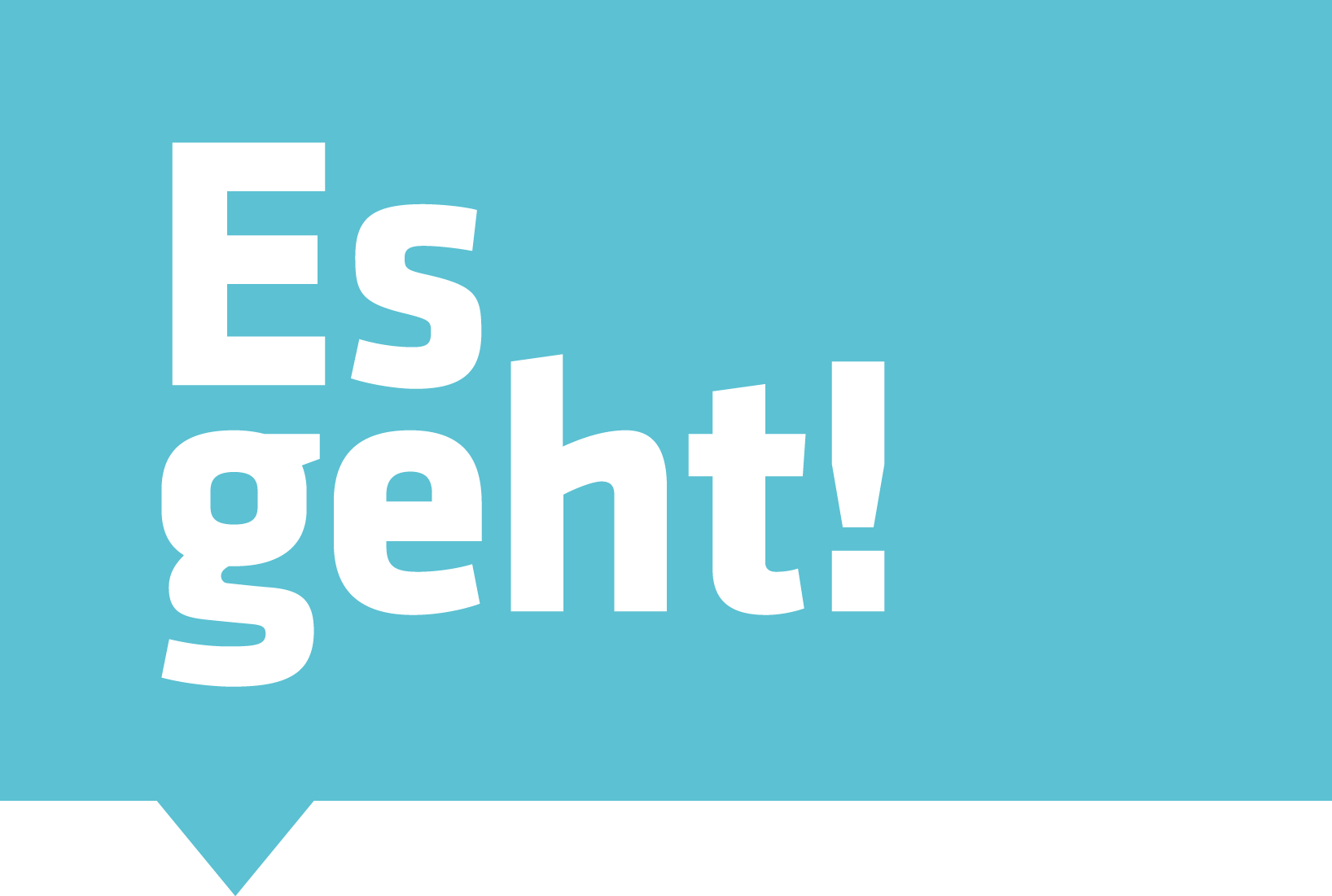So here's the deal, if you're diving into the world of German language or just trying to pick up some cool phrases, "es geht" is one of those gems you need to know. It's like the Swiss Army knife of expressions, super versatile and super useful in everyday conversations. Whether you're traveling to Germany, chatting with German friends, or just flexing your language skills, mastering "es geht" can make a huge difference. Stick around, because we're about to break it down for you in a way that's both fun and easy to understand.
Now let's talk about why "es geht" matters so much. This little phrase packs a punch because it's used in so many different situations. From casual chats to formal settings, it's everywhere. Think of it as the ultimate conversation starter or finisher. Plus, understanding its nuances can help you sound more natural when speaking German. So whether you're a beginner or a seasoned learner, this expression has something for everyone.
Before we dive deeper, let me just say this—language learning should be fun, right? That's exactly what we're aiming for here. By the end of this article, you'll not only know what "es geht" means but also how to use it like a pro. Ready? Let's do this!
- Amanda Ayala Wisconsin The Rising Star Breaking Barriers
- Nonna Pias Grandson The Heartwarming Story That Tugs At Your Heartstrings
Table of Contents
- The Origin of "Es Geht"
- Basic Meaning of "Es Geht"
- Common Contexts for "Es Geht"
- Subtleties in Usage
- Practical Examples of "Es Geht"
- Idiomatic Expressions Involving "Es Geht"
- Grammar Behind "Es Geht"
- Cultural Insights Around "Es Geht"
- Common Mistakes to Avoid
- Tips for Mastering "Es Geht"
Where Did "Es Geht" Come From?
Alright, so "es geht" literally translates to "it goes" in English. But where did this phrase come from, and why is it such a big deal? Well, it all starts with the verb "gehen," which means "to go." Over time, Germans started using "es geht" as a way to express movement, progress, or even general feelings. Think about it—it’s kind of like saying "things are moving" or "life is going on." It’s simple, yet powerful. And guess what? This phrase has been around for centuries, evolving alongside the German language itself.
Historical Context
Back in the day, "es geht" was often used in written texts to describe events or actions. For example, if someone wrote "es geht gut," they were saying that things were going well. Over time, this phrase found its way into everyday speech, becoming one of the most common expressions in modern German. So yeah, it’s been around for a while, and it’s not going anywhere anytime soon.
- Kenadie Schultz Rising Star Inspiring Journey And Everything You Need To Know
- Come Here Parrot The Ultimate Guide To Understanding And Bonding With Your Feathered Friend
What Exactly Does "Es Geht" Mean?
Let’s break it down. At its core, "es geht" can mean several things depending on the context. Most commonly, it’s used to describe how something is going. For example, if someone asks "wie geht's?" (how’s it going?), you can reply with "es geht" to say "it’s going okay." But that’s just the tip of the iceberg. Depending on the tone and situation, "es geht" can mean anything from "things are fine" to "it’s not great, but it’s not terrible either."
Variations in Meaning
Here’s the thing—language is flexible, especially in German. So while "es geht" generally means "it’s going," it can take on different shades of meaning based on how it’s used. For instance:
- When someone says "es geht nicht," they’re saying "it’s not going" or "it’s not possible."
- If you hear "es geht weiter," it means "it continues" or "things are moving forward."
- And if someone says "es geht gut," they’re telling you "things are going well."
See how versatile it is? That’s why mastering "es geht" is so important for anyone learning German.
When and Where to Use "Es Geht"
Now let’s talk about the real-world applications of "es geht." This phrase is everywhere, and understanding when to use it is key to sounding natural. For example, you’ll often hear it in casual conversations when people are checking in with each other. Imagine you’re at a coffee shop, and a friend asks "wie geht’s dir?" (how’s it going for you?). You can simply reply with "es geht," and that’s it—you’ve just had a perfectly natural exchange.
Formal vs. Informal Settings
One cool thing about "es geht" is that it works in both formal and informal situations. In a formal setting, like a job interview, you might say "es geht gut" when asked how things are going. In a more laid-back setting, like hanging out with friends, you could just say "es geht" and leave it at that. The beauty of this phrase is its adaptability—it fits wherever you need it to.
The Subtle Art of Using "Es Geht"
Here’s the thing about "es geht"—it’s not just about the words themselves. It’s also about the tone and delivery. For example, if you say "es geht" with a flat tone, it might come across as neutral or even a little unenthusiastic. But if you say it with a bit of energy, it can convey optimism or even excitement. So yeah, mastering "es geht" isn’t just about knowing what it means—it’s about knowing how to use it.
Regional Differences
Oh, and don’t forget about regional variations! In some parts of Germany, people might use "es geht" a little differently than in others. For example, in Bavaria, you might hear "es geht scho" (it’s going well) more often than "es geht gut." These small differences might seem trivial, but they can add flavor to your conversations and make you sound more authentic.
Practical Examples of "Es Geht" in Action
Let’s see "es geht" in action with some real-life examples. Imagine you’re at a party, and someone asks you how things are going. You can reply with:
- "Es geht" – Things are okay.
- "Es geht besser" – Things are going better.
- "Es geht nicht so gut" – Things aren’t going so well.
Or maybe you’re in a meeting, and someone asks if a project is on track. You can say:
- "Es geht nach Plan" – It’s going according to plan.
- "Es geht langsam" – It’s going slowly.
- "Es geht gut voran" – It’s making good progress.
See how easy it is to incorporate "es geht" into your daily conversations?
Idiomatic Expressions Involving "Es Geht"
Now let’s talk about some cool idiomatic expressions that use "es geht." These phrases can take your German skills to the next level and make you sound like a native speaker. For example:
- "Es geht um" – It’s about (used to introduce a topic).
- "Es geht los" – It’s starting (used to indicate the beginning of something).
- "Es geht mir auf die Nerven" – It’s getting on my nerves (used to express frustration).
These expressions are not only useful but also fun to use. So go ahead and try them out!
The Grammar Behind "Es Geht"
Alright, let’s get a little technical. "Es geht" is made up of two parts: "es" (it) and "geht" (goes). Together, they form a simple sentence that follows the basic structure of German grammar. The verb "gehen" is conjugated in the third person singular form, which is why we use "geht" instead of "gehen." Easy, right?
Subject-Verb Agreement
One important thing to note is that "es" is the subject of the sentence, and "geht" is the verb. This subject-verb agreement is crucial in German grammar, and it’s what makes "es geht" such a natural-sounding phrase. So if you’re ever unsure about how to use "es geht," just remember this basic rule: subject first, verb second.
Cultural Insights Around "Es Geht"
Language isn’t just about words—it’s also about culture. And when it comes to "es geht," there’s a lot of cultural significance to explore. For example, Germans often use "es geht" as a way to express humility. If someone asks how things are going, replying with "es geht" can be a way of saying "things are okay, but nothing special." It’s a subtle way of downplaying success or avoiding bragging.
Politeness and Etiquette
Another interesting aspect of "es geht" is its role in politeness and etiquette. In German culture, it’s considered polite to respond modestly when asked about your well-being. So instead of saying "everything is amazing," you might just say "es geht" to keep things humble. This cultural nuance is something to keep in mind as you navigate conversations in German.
Common Mistakes to Avoid
Now, let’s talk about some common mistakes people make when using "es geht." One of the biggest ones is overusing it. While "es geht" is versatile, it’s not a catch-all phrase. For example, you wouldn’t use it to describe specific details about a project or event. Instead, reserve it for general statements about how things are going.
Confusing Similar Phrases
Another mistake is confusing "es geht" with similar phrases like "es gibt" (there is/there are) or "es kommt" (it comes). While these phrases sound similar, they have very different meanings. So make sure you’re using the right one in the right context. Trust me, your German friends will appreciate it.
Tips for Mastering "Es Geht"
Finally, here are some tips to help you master "es geht" like a pro:
- Practice using it in different contexts to get comfortable with its versatility.
- Listen to native speakers and pay attention to how they use "es geht" in conversations.
- Try incorporating idiomatic expressions involving "es geht" into your vocabulary.
- Don’t be afraid to experiment with tone and delivery to convey different shades of meaning.
With a little practice and some patience, you’ll be using "es geht" like a native speaker in no time.
Final Thoughts
So there you have it—a deep dive into the world of "es geht." From its origins to its cultural significance, this little phrase is packed with meaning and versatility. Whether you’re a beginner or a seasoned learner, mastering "es geht" can take your German skills to the next level. So go out there and start using it—you’ve got this!
And hey, if you found this article helpful, don’t forget to leave a comment or share it with your friends. Who knows? Maybe they’ll learn something new too. Until next time, keep learning and keep growing. Tschüss!
- Kawaii Funneh From The Krew Drawing Cookie Kingdom Adventures
- Joseph Joestar Cosplay A Comprehensive Guide For Enthusiasts


